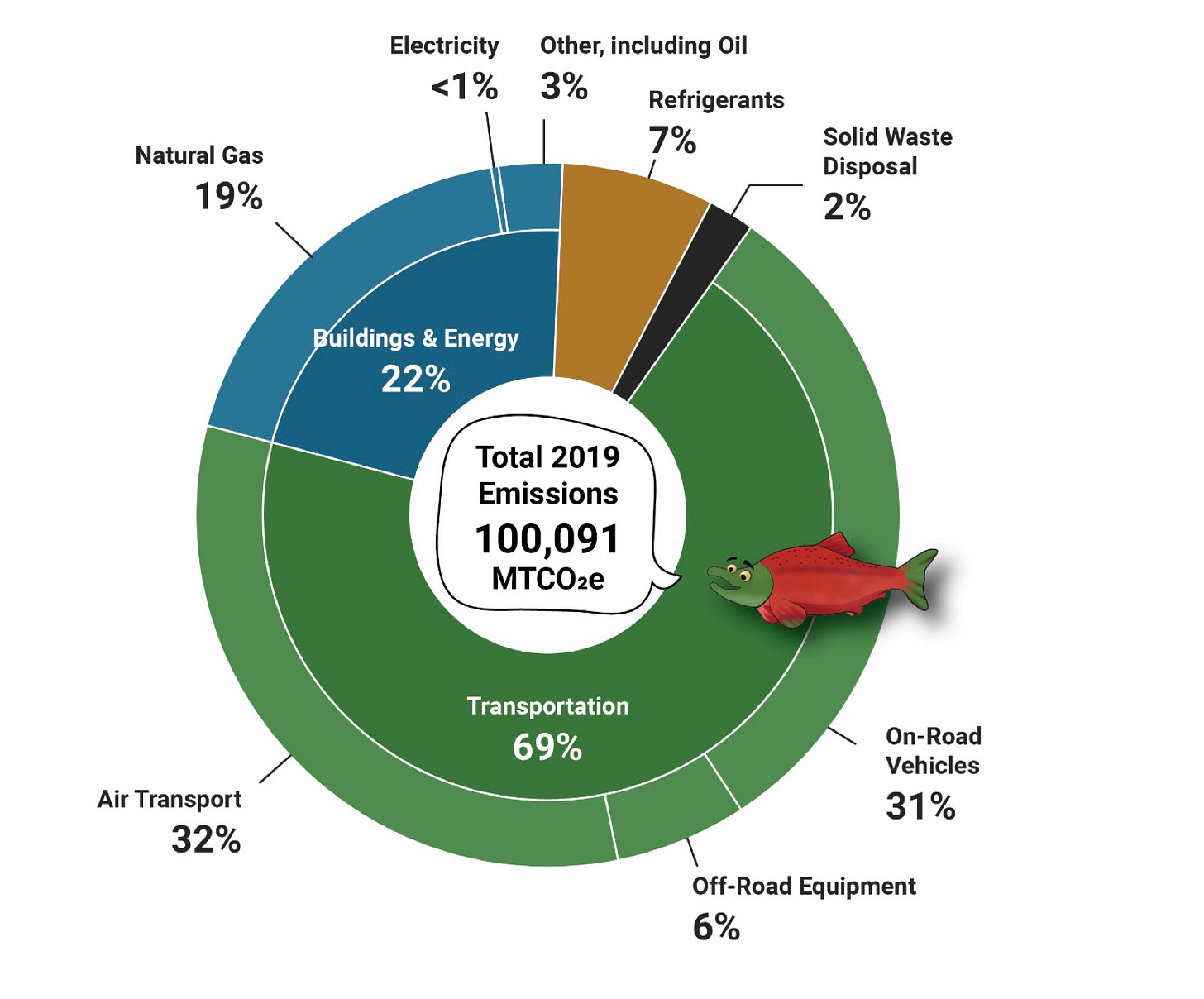Lake Forest Park’s Climate Goals Face Roadblocks
Transportation is Lake Forest Park’s largest source of pollution fueling climate change, but steering policies to drive down emissions faces a rocky road.
The Lake Forest Park Climate Policy Advisory Team (CPAT) met on March 12 to discuss actions the city might take to reduce climate-warming pollution in the city.
The city’s Climate Action Plan identifies transportation as the primary source of climate-warming pollution in Lake Forest Park. Increasing transit ridership, allowing higher-density development near transit, improving walkability, and making the city more bike-friendly can reduce emissions according to the study reviewed at the meeting.

With a $500,000 state grant, the city hired consultants to author the “Vehicle-Miles-Traveled (VMT) Reduction Strategies” study and help the CPAT committee propose a Greenhouse Gas Sub-Element for LFP’s comprehensive plan by May. Under the state’s 2023 Climate Change Planning law, the city is required to adopt polices to reduce greenhouse gas emissions and driving.
The city’s Climate Action Plan says transportation is the largest source of greenhouse gas emissions in Lake Forest Park, with drivers emitting 31% of LFP’s total greenhouse gasses. LFP passenger vehicles drove 56,142,000 miles in 2023, generating 23,510 metric tons of climate-changing pollution according to the report.
Amongst the recommendations: the city could reduce emissions with Transit-Oriented Development (TOD) by allowing higher-density residential, commercial, and mixed-use development in walking distance of transit stations. Increasing affordable housing in LFP (especially near transit) could also reduce driving by allowing more employees who work in the city to live locally, rather than commuting from outside the area due to high housing costs. Another option recommended could be to reduce parking requirements within a half-mile of transit stops.
However, the Lake Forest Park Planning Commission did not discuss Transit Oriented Development at their meeting on March 11. Instead, the planning commission is focused on updating the city’s development code to bring the city into minimum compliance with the Middle Housing law before a June 30th deadline.
Making the city a friendlier place to walk and ride a bike is another recommendation for reducing emissions in front of the Climate Policy Advisory Team. Building a pedestrian and bicycle network, possibly funded by the state’s Safe Routes to School program, could reduce school-related trips and other short drives. However, a property tax levy to pay for park improvements and sidewalks was rejected by a whopping 65% of LFP voters in 2021, indicating little support for walkability and bike safety in the city. LFP could also reduce driving with more secure bike storage and shared-use electric bicycle and scooter programs.

Transit numbers are rebounding from pandemic lows, increasing 12% to 151 million trips last year. However, according to data presented at the climate team meeting, transit trips in Lake Forest Park are remaining low compared to the King County average. While Metro’s ridership decreased by approximately 35% between 2019 and 2024, Lake Forest Park experienced a much steeper 50% reduction during the same period.
Why is not clear. But unlike neighboring cities, an LFP bus rider’s trip has not improved with the arrival of Light Rail stations in Shoreline and Mountlake Terrace. The climate team discussed recent changes to Route 522, noting the route now “truncates at light rail” at the Roosevelt station, meaning for some riders, the change turned a one-seat ride into a ride that now requires a transfer. And Route 331, the bus that runs along Ballinger Way connecting the LFP Town Center to the Mountlake Terrace station, only runs every 30 minutes at peak times.

The Stride S3 Bus Rapid Transit project, featuring all-electric, battery-powered buses and modern station stops, might improve transit ridership. Planned to launch in 2028, it will feature dedicated bus lanes, signal priorities, and queue jumps to reduce travel times from 69 minutes to 34.5 minutes and run every 10 minutes throughout the day.
Lake Forest Park has sought to delay the Stride S3 and passed regulations requiring Sound Transit to build decorative retaining walls (a non-transit expense voters did not approve). A group led by city council member Paula Goode has opposed the project, saying it would deforest the state highway. Warning of an impending traffic armageddon, the group recently hired an attorney and public relations firm and is threatening legal action to delay the project, reduce property acquisition, limit tree removals, and eliminate a dedicated bus lane in front of council member Goode’s business, Sheridan Market.
On March 12, the LFP Climate Policy Advisory Team posted a survey inviting residents to “Help Shape Lake Forest Park’s Climate Future” (nowhere in the survey’s 20 questions are residents asked if they want the city implement policies to reduce dependence on driving).
Information on how to attend and provide input on the city’s climate policies is available on the LFP website.

